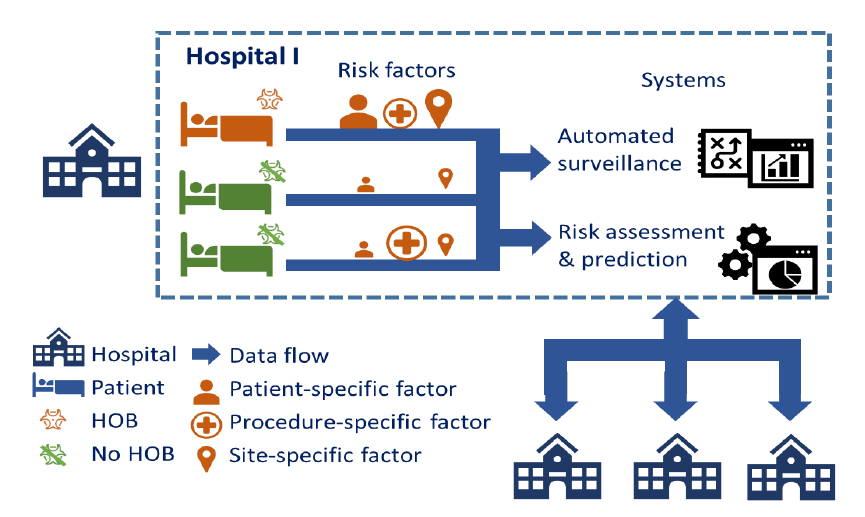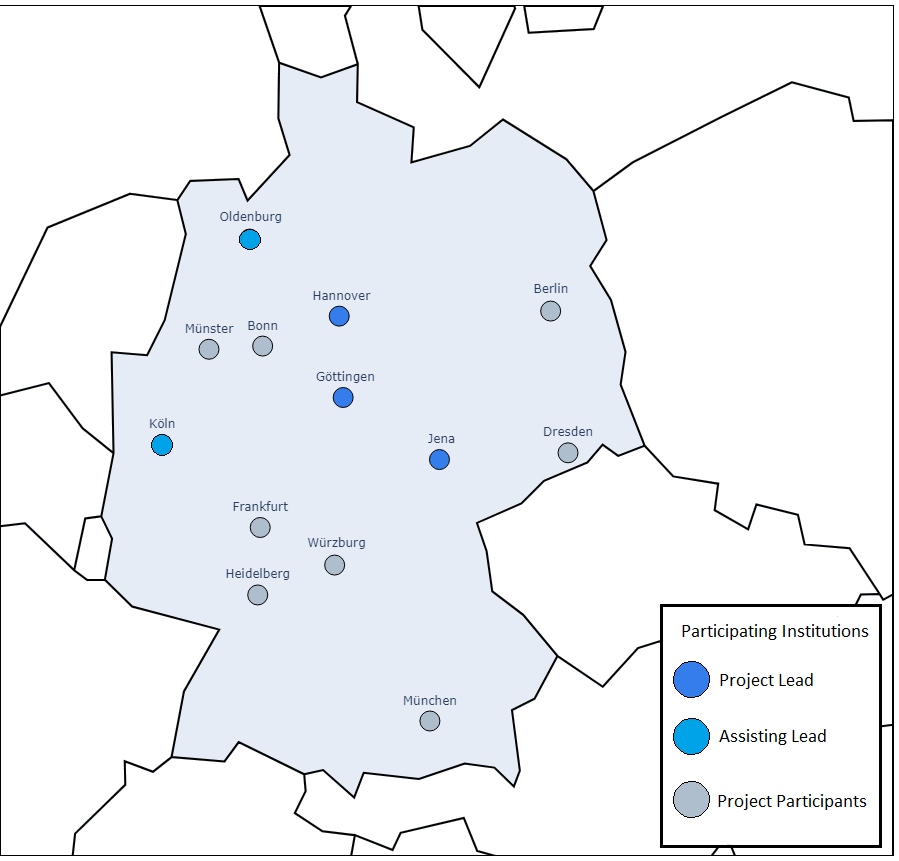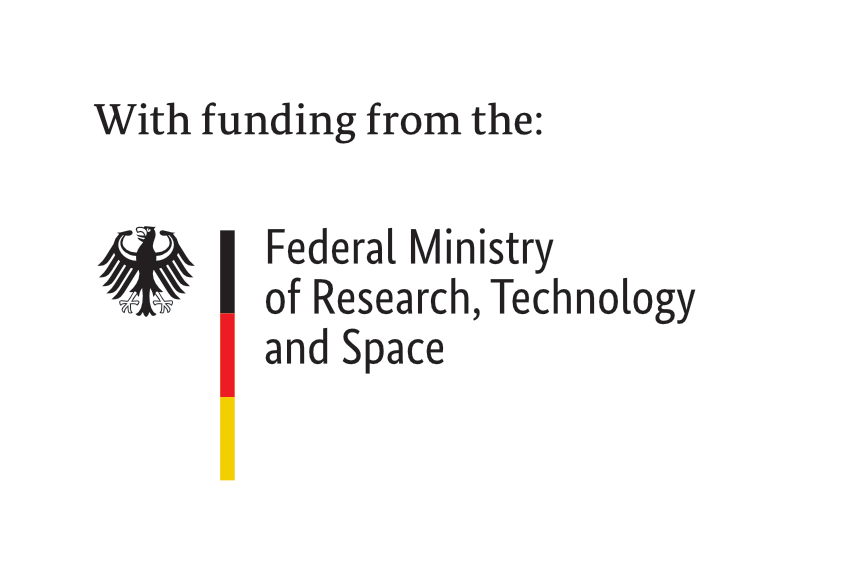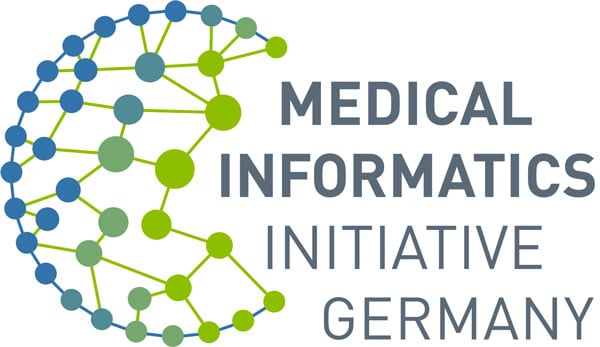Use Case RISK PRINCIPE
RISK Prediction for Risk-stratified INfection Control and PrEvention
From a medical perspective, nosocomial, or hospital-acquired, infections are one of the greatest medical burdens in high-income countries. In Germany, these infections are associated with an estimated 16,000 deaths per year. Prevention of these infections is one of the most important issues in patient safety. In addition to the negative consequences that nosocomial infections have for individual patients, these infections also lead to higher healthcare expenditures. Often, the infections are treated with antibiotics, which in turn can contribute to antimicrobial resistance, especially if their use is poorly targeted.


A multidisciplinary approach to infection prevention is therefore required to contain nosocomial infections. Surveillance, the accurate documentation and monitoring of infections, is one of the key components of prevention in individual hospitals. Based on the information obtained, healthcare professionals and policy makers can identify areas at risk and initiate targeted interventions.
However, current survey and prevention measures are overly resource-intensive (time, staff), universal rather than individually risk-adapted, and usually limited to specific wards and patient populations. Therefore, identifying the best possible combination is a requirement: Reduction of infection risk as well as optimal distribution of resources.
RISK PRINCIPE can improve the quality of patient care by helping to identify high-risk areas and patients, reducing the time required for surveillance and increasing responsiveness.
This will be tested using hospital onset bacteremia (HOBs) as an example. To achieve this goal, different data sources will be evaluated to create a risk profile, which will then be tested.
Two complexes of tasks are to be implemented:
- Use of patient data to create a patient- or patient group-specific risk profile that can be transferred to a computer-assisted application.
- Design and validation of a (semi-)automated surveillance system including visualization.
Preliminary work and experience from the MII consortia such as HiGHmed, DIFUTURE and SMITH will be used.
The project builds on a strategic alliance between IT, surveillance and infection prevention that serves as a fundamental basis for sustainable collaboration over time. In addition to 13 university hospitals, the RKI, the National Reference Center for Surveillance of Nosocomial Infections and the Aktionsbündnis Patientensicherheit are also involved in the project.
In summary, RISK PRINCIPE addresses the goal of developing and implementing (semi-)automated surveillance and data-based risk prediction for bloodstream infections with subsequent visualization for more effective and efficient infection prevention.
The project started on July 1, 2023.
Involved university hospitals

Charité - Universitätsmedizin Berlin (CHAR)
Petra Gastmeier
Seven Johannes Sam Aghdassi
Michael Behnke
Fabian Prasser
Hannover Medical School (MHH)
Michael Marschollek (Co-PI)
Dirk Schlüter
Claas Baier
Robert Koch Insitute Berlin (RKI)
Tim Eckmanns
Ann Christin Vietor
Technical University of Munich (TUM)
Martin Boeker
Dirk Busch
Friedemann Gebhardt
University Hospital Cologne (UKK)
Tatiana von Landesberger
University Hospital Dresden (UKD)
Martin Sedlmayr
Katja de With
University Hospital Frankfurt (UKF)
Holger Storf
Jörg Janne Vehreschild
University Hospital Heidelberg (UKHD)
Martin Dugas
Alexander Dalpke
University Hospital Jena (UKJ)
Mathias Pletz (Co-PI)
André Scherag (Co-PI)
Danny Ammon
University Hospital Münster (UKM)
Alexander Mellmann
University Medical Center Göttingen (UMG)
Simone Scheithauer (PI)
Martin Kaase
Nicolas Reinoso-Schiller
Martin Misailovski
Dagmar Krefting
Martin Wiesenfeldt
University Medical Center Ostwestfalen-Lippe (UK-EWL)
Claudia Hornberg
Christian Philipps
University Medicine Oldenburg (UOL)
Antje Wulff
University Hospital Würzburg (UKW)
Oliver Kurzai
Rüdiger Pryss
Contact
Prof. Dr. med. Simone Scheithauer
Project coordination
University Medical Center Göttingen
Institute for Hospital Hygiene and Infectiology
Robert-Koch-Straße 40
37075 Göttingen
T: +49 551 3962091
T: +49 551 3962093Prof. Dr. med. Mathias Pletz
Project Co-Coordination
University Hospital Jena
Institute of Infectious Diseases and Infection Control
Am Klinikum 1
07747 Jena
T: +49 3641 9324650
Prof. Dr. André Scherag
Project Co-Coordination
University Hospital Jena
Institute of Medical Statistics, Computer and Data Sciences (IMSID)
Bachstraße 18
07743 Jena
T: +49 3641 9396954
Prof. Dr. med. Dr.-Ing. Michael Marschollek
Project Co-Coordination
Peter L. Reichertz Institute for Medical Informatics
Of the TU Braunschweig and Medizinischen Hochschule Hannover
Karl-Wiechert-Allee 3
30625 Hannover
T: +49 511 5325295


